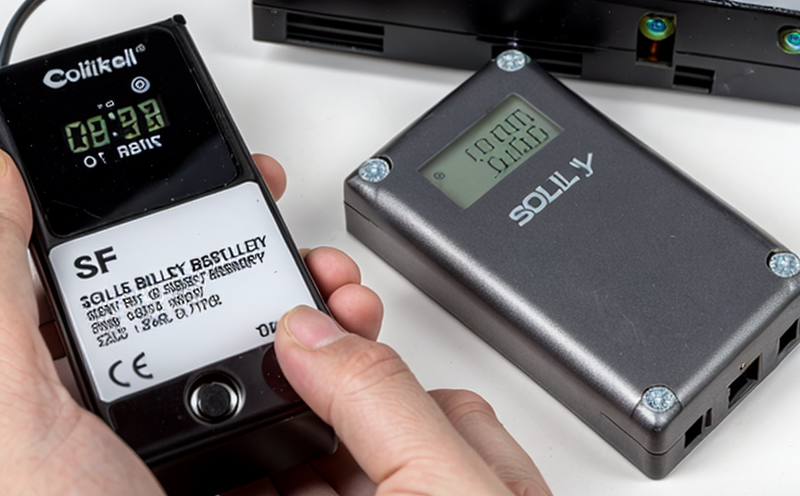UL 2580 Solid-State Battery Testing for EV Systems
The UL 2580 standard has been a cornerstone in the development and certification of solid-state batteries, especially within electric vehicle (EV) systems. This standard ensures that these batteries meet stringent safety requirements, which is critical given their potential to store high amounts of energy. Solid-state batteries are characterized by an electrolyte made entirely or partially of solid materials, eliminating the risk associated with liquid or gel-based electrolytes in traditional lithium-ion cells.
The UL 2580 testing protocol evaluates various aspects including mechanical stability, electrical performance, and thermal management under extreme conditions. This ensures that batteries can withstand harsh environments while maintaining peak operational efficiency. For electric vehicles, which rely heavily on battery performance and safety, this is particularly important as it directly impacts the vehicle's range, reliability, and overall user experience.
The testing process involves subjecting the batteries to a series of environmental stressors such as high temperatures, low temperatures, vibration, and mechanical pressure. These tests are designed to simulate real-world conditions that might be encountered during transportation or operation. By adhering strictly to UL 2580 standards, manufacturers can ensure their products meet rigorous safety benchmarks.
Understanding the specifics of this test is crucial for engineers and quality managers involved in the design and development of electric vehicle systems. It allows them to identify potential weaknesses early on and implement necessary improvements before commercialization. This proactive approach not only enhances product safety but also fosters innovation by encouraging continuous improvement.
Compliance with UL 2580 is particularly beneficial for companies looking to enter competitive markets where stringent safety regulations are in place. Meeting these standards can significantly reduce the risk of recalls and lawsuits, thereby protecting brand reputation and consumer trust. Furthermore, successful compliance often serves as a strong selling point when marketing products to potential customers.
In summary, UL 2580 solid-state battery testing for EV systems is more than just regulatory compliance; it represents best practice in ensuring superior product performance and safety. For stakeholders involved in the industry, investing time and resources into understanding and implementing this standard can yield substantial long-term benefits.
Why Choose This Test
Selecting UL 2580 solid-state battery testing is a strategic decision aimed at enhancing product safety and reliability. This choice offers several key advantages:
- Comprehensive Safety Standards: Adhering to UL 2580 ensures that all aspects of the battery’s design, construction, and operation meet strict safety requirements.
- Innovation Support: By staying ahead of industry trends through rigorous testing procedures, manufacturers can continuously improve their products.
- Market Access: Compliance with this standard opens doors to various markets that have stringent safety regulations in place.
- Customer Confidence: Demonstrating commitment to high standards builds trust and loyalty among consumers.
In today’s highly competitive market, these benefits translate into increased competitiveness and a stronger brand reputation. Quality managers and compliance officers play pivotal roles in ensuring that their organizations benefit fully from such testing protocols.
Quality and Reliability Assurance
The UL 2580 standard plays an essential role in guaranteeing the quality and reliability of solid-state batteries used in EV systems. Compliance with this standard ensures that all components meet stringent performance criteria under various conditions, including temperature extremes, mechanical stress, and voltage fluctuations.
One critical aspect of this testing involves evaluating the battery’s ability to maintain its integrity during severe environmental stresses. This includes exposure to temperatures ranging from -40°C to +85°C, which simulates typical operating environments for EVs in different climates. Additionally, batteries must endure mechanical shocks and vibrations equivalent to those experienced during transport or use.
Another key component of the test is assessing electrical performance parameters such as internal resistance, capacity retention, and charging/discharging cycles. These metrics help determine how effectively a battery can store and release energy over time. High-quality batteries should demonstrate minimal changes in these characteristics throughout their lifecycle, indicating superior reliability.
Thermal management is also crucial for maintaining safe operating temperatures within acceptable limits. During testing, the battery’s ability to dissipate heat efficiently without overheating or thermal runaway must be verified. This ensures that EV systems remain stable and safe under all conditions.
In conclusion, rigorous adherence to UL 2580 standards helps manufacturers produce reliable solid-state batteries capable of meeting both current safety requirements and future technological advancements. This commitment translates into enhanced product performance, reduced warranty claims, and increased customer satisfaction.
Use Cases and Application Examples
The application of UL 2580 solid-state battery testing is extensive, particularly in the realm of electric vehicle (EV) systems. Here are some specific use cases:
- Prototype Evaluation: Engineers can utilize this standard to evaluate prototypes before full-scale production.
- Manufacturing Quality Control: Continuous testing ensures consistent battery quality throughout the manufacturing process.
- Field Safety Assessments: After deployment, ongoing monitoring helps identify any emerging safety issues promptly.
Innovative companies are leveraging UL 2580 to push boundaries in terms of battery technology. By adhering strictly to these standards, they not only enhance product safety but also contribute significantly to the advancement of electric vehicle technology.





